| Srl | Item |
| 1 |
ID:
076919
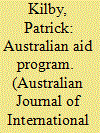

|
|
|
|
|
| Publication |
2007.
|
| Summary/Abstract |
The Australian government's White Paper on aid provides a blue print for the Australian aid program for the next decade. While it ostensibly has a focus on poverty, it still sees economic growth and effective government as the path to poverty reduction. This article analyses and highlights the issues associated with this approach to poverty. These are: growing inequality and vulnerability, the rural-urban divide in poverty outcomes, and increasing social exclusion leading to increasing social and political insecurity. The article then examines the alternative policies adopted by the British aid agency, DFID, and concludes with some suggestions on how the practice of the Australian aid program can better match the goal of poverty reduction
|
|
|
|
|
|
|
|
|
|
|
|
|
|
|
|
| 2 |
ID:
123511
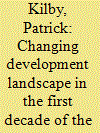

|
|
|
|
|
| Publication |
2012.
|
| Summary/Abstract |
The first decade of the 21st century has been characterised by complex and interrelated changes that have affected development. Development studies as a discipline has traditionally been concerned with the impact of colonisation and neocolonialism, and with neoliberal-related growth models. This paper argues that, since around the turn of the century, there has been a major shift in development, driven by a series of fundamental changes, including the relative failure of the neoliberal project in the 1980s and 1990s, which by the 2000s was partly replaced by a greater concern with addressing security issues with aid; the rise of China and other middle-income countries as large resource providers for development; and the rapid increase of remittance flows to lower and middle income countries. The paper looks at how both development studies and aid policy in Australia and elsewhere have been relatively slow to engage with this rapidly changing context. The big challenges for development studies will be: engaging with developing countries as development donors with different agendas for development; the decline of much of the current neoliberal paradigm; alternative sources of development finance; and the securitisation of Western aid.
|
|
|
|
|
|
|
|
|
|
|
|
|
|
|
|
| 3 |
ID:
160830
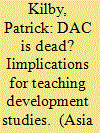

|
|
|
|
|
| Summary/Abstract |
This paper argues that the Western paradigm of foreign aid promoted by the Development Assistance Committee is rapidly losing relevance in development studies and its related academic teaching programmes. The longstanding Southern‐led approaches to aid and development are now coming to the fore. China's Five Principles of Peaceful Coexistence (finalised at Bandung in 1955) and the Eight Principles for Economic Aid and Technical Assistance to Other Countries (1964) are increasingly emphasised as points of difference to Western aid. It is the rise of the South that has challenged the dominant development paradigm(s) over the past 50 years. The discipline of development studies has been slow to address these challenges in how it trains future development practitioners. I will argue that development studies programmes in Australian universities have a focus on Western foreign aid: either questioning its hegemonic nature as a tool for neo‐liberal or neo‐colonial development on the one hand; or questioning aid effectiveness and how well it addresses contemporary challenges. This paper explores the challenges in examining South–South cooperation and a different development paradigm in producing relevant development studies curricula and pedagogies.
|
|
|
|
|
|
|
|
|
|
|
|
|
|
|
|
| 4 |
ID:
083211
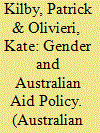

|
|
|
|
|
| Publication |
2008.
|
| Summary/Abstract |
The issue of gender and development has been an important part of the development discourse since the Mexico City Women Conference in 1973. This concern has been very slow to transform itself into policy. For development agencies including AusAID it has been a subsidiary policy area or an add-on, as a recipe might say'add women and stir'. The White Paper of 2007 brought gender to the centre of policy as an overarching principle. The question that arises is the extent to which these policies fit into or are driven by the neo-liberal paradigm underpinning the aid program, or if these policies can challenge it by positing a rights agenda. The 2007 Gender policy tries to sit between the two in that it focuses on the economic role that women can play in fostering growth on the one hand, and the denial of human rights that marginalisation and disempowerment represents. This paper will explore the development of gender policy in AusAID, and compare it with the development of policy of other agencies that follow the neo-liberal framework in particular the World Bank and ADB. Finally the paper will make some suggestions for the new Labor government to strengthen the Policy
|
|
|
|
|
|
|
|
|
|
|
|
|
|
|
|
| 5 |
ID:
083213
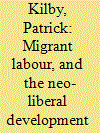

|
|
|
|
|
| Publication |
2008.
|
| Summary/Abstract |
The zeal with which the free movement of goods is pursued through the World Trade Organisation, or the free moment of capital promoted by the International Monetary Fund is contrasted by the hostility of most government and international organizations towards the free movement of labour
|
|
|
|
|
|
|
|
|
|
|
|
|
|
|
|